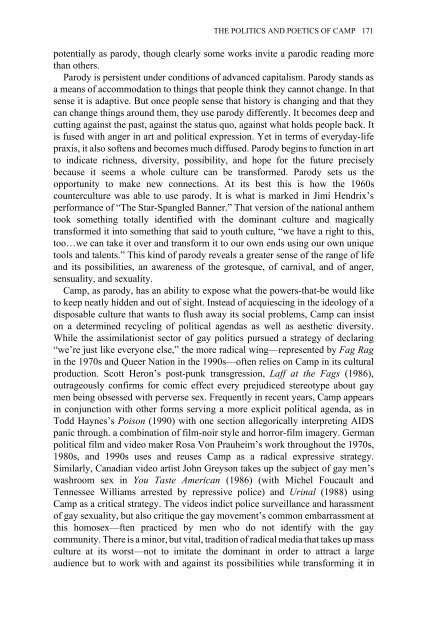Edited by Moe Meyer - Get a Free Blog
Edited by Moe Meyer - Get a Free Blog
Edited by Moe Meyer - Get a Free Blog
Create successful ePaper yourself
Turn your PDF publications into a flip-book with our unique Google optimized e-Paper software.
THE POLITICS AND POETICS OF CAMP 171<br />
potentially as parody, though clearly some works invite a parodic reading more<br />
than others.<br />
Parody is persistent under conditions of advanced capitalism. Parody stands as<br />
a means of accommodation to things that people think they cannot change. In that<br />
sense it is adaptive. But once people sense that history is changing and that they<br />
can change things around them, they use parody differently. It becomes deep and<br />
cutting against the past, against the status quo, against what holds people back. It<br />
is fused with anger in art and political expression. Yet in terms of everyday-life<br />
praxis, it also softens and becomes much diffused. Parody begins to function in art<br />
to indicate richness, diversity, possibility, and hope for the future precisely<br />
because it seems a whole culture can be transformed. Parody sets us the<br />
opportunity to make new connections. At its best this is how the 1960s<br />
counterculture was able to use parody. It is what is marked in Jimi Hendrix’s<br />
performance of “The Star-Spangled Banner.” That version of the national anthem<br />
took something totally identified with the dominant culture and magically<br />
transformed it into something that said to youth culture, “we have a right to this,<br />
too…we can take it over and transform it to our own ends using our own unique<br />
tools and talents.” This kind of parody reveals a greater sense of the range of life<br />
and its possibilities, an awareness of the grotesque, of carnival, and of anger,<br />
sensuality, and sexuality.<br />
Camp, as parody, has an ability to expose what the powers-that-be would like<br />
to keep neatly hidden and out of sight. Instead of acquiescing in the ideology of a<br />
disposable culture that wants to flush away its social problems, Camp can insist<br />
on a determined recycling of political agendas as well as aesthetic diversity.<br />
While the assimilationist sector of gay politics pursued a strategy of declaring<br />
“we’re just like everyone else,” the more radical wing—represented <strong>by</strong> Fag Rag<br />
in the 1970s and Queer Nation in the 1990s—often relies on Camp in its cultural<br />
production. Scott Heron’s post-punk transgression, Laff at the Fags (1986),<br />
outrageously confirms for comic effect every prejudiced stereotype about gay<br />
men being obsessed with perverse sex. Frequently in recent years, Camp appears<br />
in conjunction with other forms serving a more explicit political agenda, as in<br />
Todd Haynes’s Poison (1990) with one section allegorically interpreting AIDS<br />
panic through. a combination of film-noir style and horror-film imagery. German<br />
political film and video maker Rosa Von Prauheim’s work throughout the 1970s,<br />
1980s, and 1990s uses and reuses Camp as a radical expressive strategy.<br />
Similarly, Canadian video artist John Greyson takes up the subject of gay men’s<br />
washroom sex in You Taste American (1986) (with Michel Foucault and<br />
Tennessee Williams arrested <strong>by</strong> repressive police) and Urinal (1988) using<br />
Camp as a critical strategy. The videos indict police surveillance and harassment<br />
of gay sexuality, but also critique the gay movement’s common embarrassment at<br />
this homosex—ften practiced <strong>by</strong> men who do not identify with the gay<br />
community. There is a minor, but vital, tradition of radical media that takes up mass<br />
culture at its worst—not to imitate the dominant in order to attract a large<br />
audience but to work with and against its possibilities while transforming it in


